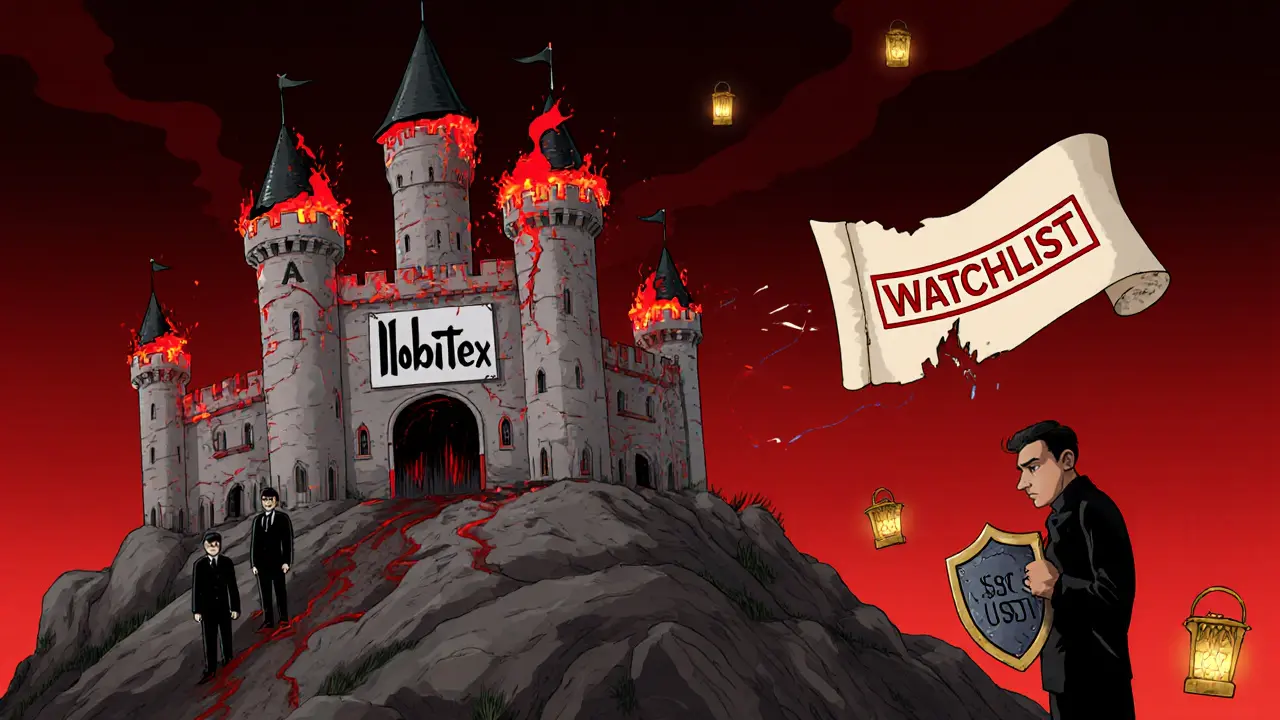Crypto Exchange Risk Checker for Iranian Users
This tool helps you evaluate the risk level of different cryptocurrency exchanges for Iranian users in 2025. Based on current sanctions, security breaches, and regulatory changes, select an exchange below to see its risk profile.
Trying to trade crypto from Iran feels like walking through a minefield. Between U.S. sanctions, new Iranian laws, and a wave of hacks, many platforms that look safe at first glance can disappear your funds overnight. This guide cuts through the noise and tells you exactly which exchanges you should steer clear of in 2025, why they’re risky, and what red flags to watch for.
Key Takeaways
- Avoid any exchange that relies heavily on USDT or other U.S.-issued stablecoins - they are already being frozen for Iranian users.
- Stay away from domestically‑dominant platforms like Nobitex, the largest Iranian crypto exchange, which is under international sanctions and suffered a $90million hack in June2025.
- Major global exchanges (Coinbase, Binance, Kraken) enforce strict sanctions screening; Iranian‑linked accounts are often frozen or banned.
- Platforms that focus on stablecoins face new Iranian limits of $5k annual purchases and $10k holding caps - non‑compliance can trigger legal action.
- Unlicensed or informal peer‑to‑peer sites lack any consumer protection and are prime targets for exit scams.
Why Sanctions Matter for Iranian Traders
Since the U.S. re‑imposed sanctions on Iran in early 2025, every crypto company that wants to keep a foothold in the global market has been forced to run a tight compliance engine. The most visible sign of that enforcement was the July22025 Tether freeze, where 42 addresses linked to Iranian activity were blocked, wiping out tens of millions of dollars. The freeze didn’t just hit a handful of wallets - half of them were tied to Nobitex users, showing how quickly a single compliance action can cripple a whole ecosystem.
Beyond the immediate loss of funds, sanctions bring legal risk. If an exchange complies with U.S. rules, it may be obligated to hand over user data to U.S. authorities, exposing Iranian traders to potential prosecution or asset seizure. That’s why many users look for “off‑shore” platforms, but the same compliance pressure often follows those exchanges, too.
Domestic Exchanges That Should Raise Alarm Bells
Iran’s own crypto scene is dominated by a few big names, and most of the danger comes from those very platforms.
Nobitex - The Double‑Edged Giant
With over 11million users, Nobitex feels like the natural first stop for anyone in Iran. But three things make it a high‑risk choice:
- Sanctions listing: International authorities have placed Nobitex on a sanctions watchlist for facilitating cross‑border transfers that evade U.S. restrictions.
- Security breach: In June2025 a cyber‑attack stole more than $90million, highlighting weak security practices.
- IRGC ties: Data from Elliptic shows wallet clusters connected to the Islamic Revolutionary Guard Corps, meaning the exchange is part of a broader sanctions‑evasion network.
Even if you’re willing to take a risk, the combination of sanctions, hack history, and political connections makes Nobitex a poor bet for long‑term asset safety.
Other Licensed Iranian Platforms
Since early 2025 the Central Bank of Iran has shut down rial‑based payment gateways and demanded that every crypto exchange obtain a license, submit full transaction logs, and enforce AML/KYC checks. While licensing sounds reassuring, it also means the government can freeze accounts on short notice or compel exchanges to hand over user data. Any platform that complies fully with these requirements is effectively a surveillance tool, which is especially dangerous if you’re dealing with assets that could be frozen abroad.

International Exchanges With Strict Sanctions Screening
Big names like Coinbase, Binance, and Kraken have sophisticated compliance departments. They scan IP addresses, KYC data, and transaction patterns to flag any Iranian‑linked activity. The result? Frozen accounts, seized funds, or permanent bans.
For example, after the Tether freeze, Coinbase sent a warning to all users with Iranian IPs to withdraw USDT within 48hours, or face account termination. Binance follows a similar policy and has been reported to block withdrawals to Iranian wallets outright. The bottom line: if you value access to your assets, treat these tier‑1 platforms as off‑limits unless you have a robust legal strategy for dealing with sanctions.
Stablecoin‑Focused Platforms Under New Iranian Limits
In September2025 Iran introduced hard caps on stablecoin transactions: $5k per year for purchases and a $10k holding ceiling for individuals. Exceeding those limits triggers a one‑month compliance window, after which authorities can levy fines or seize assets.
Platforms that specialize in USDT, USDC, or other fiat‑pegged tokens are now high‑risk. Not only do they risk a freeze from the issuing company (as we saw with Tether), but the Iranian government may also target the exchange itself for violating the new caps. If you need stablecoins, consider decentralized alternatives like DAI on Polygon, which are less likely to be directly monitored by either U.S. or Iranian regulators.
Unregulated or Informal Peer‑to‑Peer Markets
When official channels become too risky, many traders turn to informal Telegram groups or local P2P pages. These “grey market” venues lack any consumer protection, escrow, or dispute‑resolution mechanisms. Scammers can walk away with your crypto in minutes, and there’s no legal recourse.
Moreover, Iranian fintech associations warn that the crackdown on licensed exchanges could inadvertently push more users toward these underground platforms, escalating fraud rates. If you must use a P2P service, demand multi‑signature escrow, verify the counterparty’s reputation on multiple channels, and keep transaction sizes low.
How to Stay Safe: Practical Tips for Iranian Crypto Users
- Check the exchange’s sanctions list status. A quick search on the OFAC or UN sanctions databases can reveal if the platform is flagged.
- Avoid heavy reliance on USDT. Use decentralized stablecoins (DAI, FRAX) or native blockchain assets instead.
- Prefer non‑custodial wallets. Keep your private keys offline; custodial services can be frozen without warning.
- Monitor regulatory updates. Iran’s crypto laws shift every few months - stay subscribed to reputable local news sources.
- Use VPNs wisely. While a VPN can mask your IP, it does not protect against KYC‑based freezes if you’ve already provided personal data.
- Limit transaction size. Smaller, frequent trades are less likely to trigger automated compliance flags.
Risk Comparison Table
| Exchange | Sanctions Exposure | Security Record | Domestic Licensing | Stablecoin Focus |
|---|---|---|---|---|
| Coinbase | High - strict OFAC screening | Excellent (no major hacks) | N/A (US‑based) | Low - supports many assets |
| Binance | High - global compliance unit | Good (2022 hack, funds recovered) | N/A | Medium - large USDT volume |
| Kraken | High - proactive freeze policy | Good (few minor incidents) | N/A | Low |
| Nobitex | Very High - on sanctions watchlist | Poor - $90M hack June2025 | Licensed but under heavy state oversight | Medium - heavy USDT usage |
| Local licensed exchanges (e.g., PayPingX) | Medium - domestic regulations only | Varied - depends on provider | Required - subject to Iranian AML/KYC | Varies - many limit stablecoins |
| P2P Telegram groups | Low - no official screening | Very Poor - no security guarantees | Unlicensed | Often high (USDT swaps) |
What to Do If Your Account Gets Frozen
If you find yourself locked out of an exchange, act fast:
- Gather all relevant transaction IDs, screenshots, and KYC documents.
- Contact support through the official channel - use email, not social media.
- If the freeze is due to sanctions, consider filing a legal appeal with a qualified international attorney.
- Meanwhile, move any remaining assets to a non‑custodial wallet you control.
Remember, once an exchange complies with a sanction order, the assets are often considered seized, so prevention is far cheaper than remediation.
Future Outlook: How Risks May Evolve
The crypto landscape for Iranian users is unlikely to stabilize soon. The U.S. may tighten sanctions further, especially around stablecoins, while Iran continues to draft stricter licensing rules. Keep an eye on two signals:
- Announcements from the Iranian Central Bank about new transaction limits or tax regimes.
- Updates from major stablecoin issuers (Tether, Circle) about compliance with OFAC.
Adapting quickly - switching to decentralized assets, using hardware wallets, and staying informed - is the only way to protect your crypto in this moving target.
Frequently Asked Questions
Can I use a VPN to hide my Iranian IP from exchanges?
A VPN masks your IP, but most exchanges also check KYC documents, phone numbers, and banking details. If those data points reveal an Iranian connection, the account can still be frozen.
Is it safe to hold USDT on a hardware wallet?
Yes, storing USDT on a non‑custodial hardware wallet keeps it out of exchange‑level compliance checks. However, the token itself can still be frozen on the blockchain if a court order forces a smart‑contract freeze, which is rare but possible.
What alternatives exist to USDT for Iranian traders?
Decentralized stablecoins like DAI (on Polygon or Ethereum) and FRAX are less likely to be targeted by sanctions because they’re not issued by a U.S. entity. Native assets such as Bitcoin or Ethereum also avoid stablecoin caps.
How can I verify if an exchange is on a sanctions list?
Check the OFAC SDN list or the UN sanctions database. Many reputable crypto news sites also publish regular updates on exchanges that have been added or removed.
What should I do if I suspect a hack on my exchange?
Immediately withdraw whatever you can to a personal wallet, change all passwords, enable 2FA, and contact support. Monitor community channels for any official breach notices.


Jasmine Kate
Crypto trading from Iran feels like stepping into a fireworks factory blindfolded; one wrong spark and everything blows up, especially with the U.S. sanctions hanging over every exchange like a guillotine waiting to drop.
Nicholas Kulick
The guide correctly points out that U.S. sanctions are the primary risk for Iranian traders. Sanctions mean exchanges must freeze any account tied to Iranian IPs or personal data. Therefore, the first line of defense is to avoid providing any identifying information. Use a non‑custodial wallet where you control the private keys. Keep your funds on hardware devices that are never online. If you must interact with an exchange, choose one that does not enforce KYC for small volumes. Decentralized exchanges allow you to swap tokens without revealing your identity. However, DEXs come with higher slippage and potential smart‑contract risks. To mitigate those, stick to well‑audited contracts and limit trade size. Monitor the OFAC SDN list weekly to catch any newly flagged platforms. When using VPNs, remember they mask your IP but not your KYC documents. Always enable two‑factor authentication on any account you keep. Diversify your holdings across multiple blockchains to avoid a single point of failure. Keep a cold‑storage backup of your seed phrase in a secure, offline location. Finally, stay informed about Iranian regulatory updates, as limits on stablecoins can change with little notice.
Kate O'Brien
They’re not just blocking accounts, they’re tracking every digital breadcrumb you leave; the whole system is a massive surveillance grid built by elites who want to keep us offline.
Ricky Xibey
Stay away from any exchange that asks for your passport.
Sal Sam
From a technical standpoint, the attack surface on platforms like Nobitex expands dramatically when they tie user accounts to on‑chain KYC hashes; each hash becomes a potential de‑anonymization vector. Moreover, the lack of multi‑signature withdrawal controls exacerbates the risk of insider theft. Coupled with the fact that their smart‑contract audit logs are publicly unavailable, you’re essentially handing over a black box to a regulator. In short, the probability‑risk matrix tilts heavily toward loss.
Moses Yeo
Contrary to the mainstream narrative; the sanctions regime is merely a façade; a tool wielded by geopolitics to manipulate market liquidity; indeed, by shunning these exchanges you might inadvertently empower the very entities you wish to avoid; the truth is often hidden behind layers of regulatory rhetoric; remember, every “compliance” checkpoint is a potential choke point for capital flow.
Lara Decker
While the jargon sounds impressive, the core issue remains simple: a platform with poor security and a history of hacks is a ticking time bomb; no amount of technical lingo can fix a fundamentally insecure architecture.
Anna Engel
Oh great, another guide telling us to avoid exchanges that already lock us out-thanks for stating the obvious in three extra bullet points.
manika nathaemploy
i totally get how scary this is, it feels like every step you take could be a trap, stay safe out there and keep your crypto locked away.
Mark Bosky
This guide provides a comprehensive risk assessment that aligns with current OFAC directives and Iranian regulatory updates. It is advisable to prioritize exchanges that do not require extensive KYC for low‑volume transactions. Additionally, employing hardware wallets for cold storage mitigates custodial exposure. Regularly reviewing sanction lists will help maintain compliance and protect assets.
Mark Fewster
Indeed, incorporating hardware wallets into your security strategy is a prudent measure; further, periodic verification of seed phrase integrity is essential; this practice ensures recoverability in the event of device failure.
Monafo Janssen
Keeping things simple works best-use a reputable non‑custodial wallet, avoid giving personal data, and stay updated on the latest sanctions news.
Jason Duke
Exactly! Simplicity is power; the fewer moving parts you have, the less chance something blows up; stay lean, stay safe, and keep those assets under your own keys!
Heather Zappella
From a regulatory perspective, the distinction between “licensed” and “unlicensed” exchanges hinges on whether they submit transaction logs to Iran’s central bank; this difference directly impacts the legal exposure of users who hold stablecoins on those platforms.
Jason Wuchenich
That’s a solid point; staying with licensed platforms when possible reduces the risk of sudden freezes, and maintaining a diversified portfolio adds an extra layer of protection.